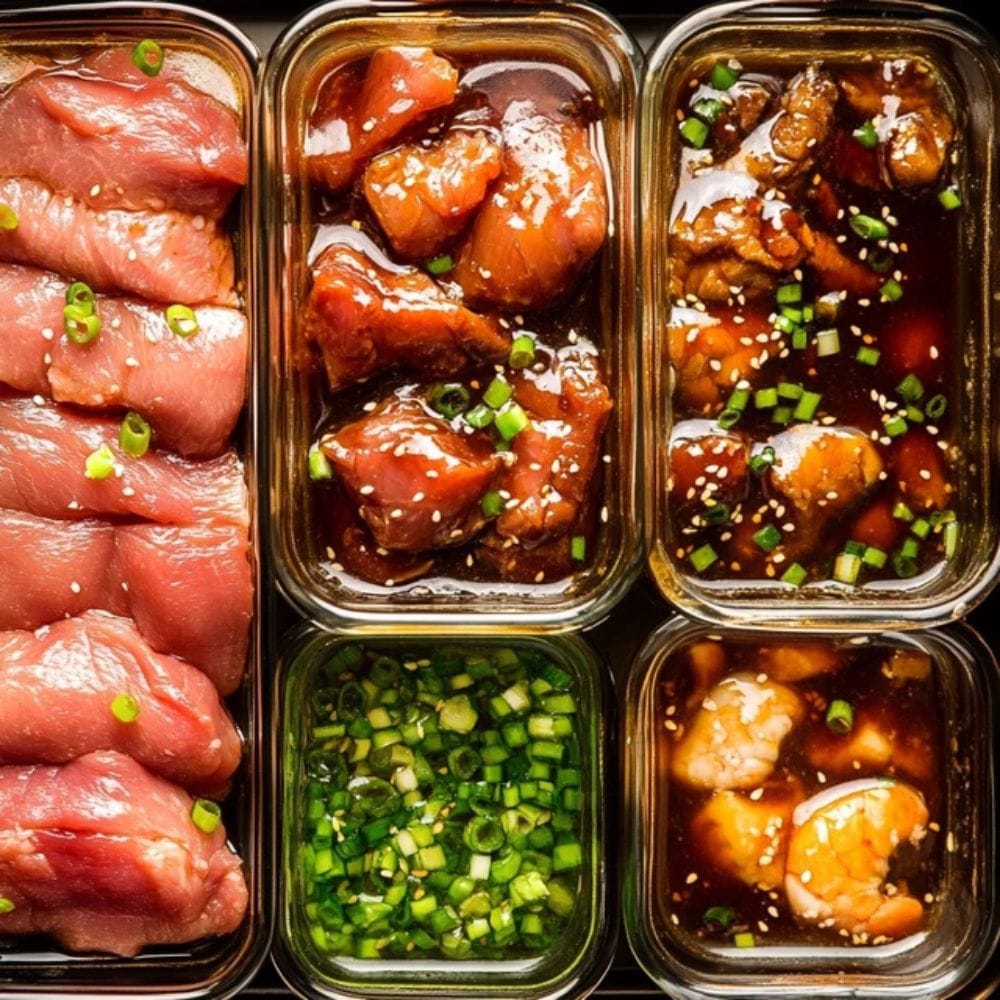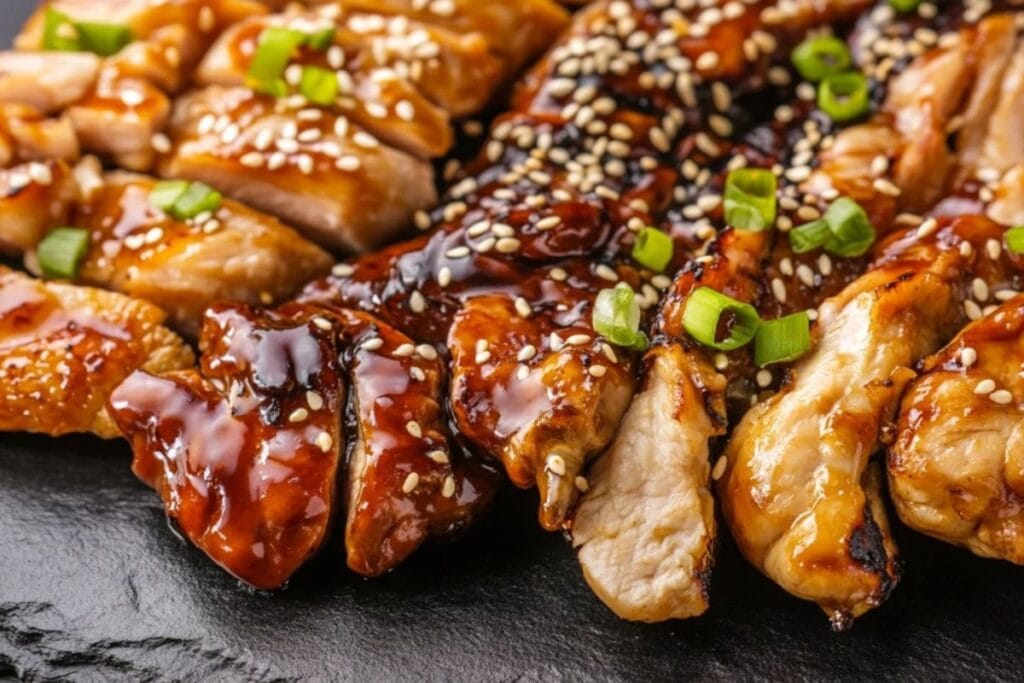I love the sweet and salty charm of teriyaki sauce. People around here often ask if they should marinate teriyaki when whipping up juicy chicken or tender steak. It’s a question worth exploring. This flavorful sauce comes from Japan and has won hearts across the globe. Many cooks say marinate teriyaki to deepen tastes in their everyday meals.
Some folks swear by marinate teriyaki for extra savory goodness. Others like a quick brush right before grilling. Yet, the right choice depends on your protein and cooking style. You can gently soak poultry, seafood, or red meats in teriyaki, then cook them to create bold bites. Marinate teriyaki can be a simple path to succulent results.
Understanding Teriyaki Sauce Ingredients
Traditional Ingredients in Teriyaki Sauce
Authentic teriyaki sauce is a simple yet deeply flavorful combination of key ingredients that create a balanced sweet-salty glaze. Traditional versions include:
- Soy Sauce – Provides a deep umami richness and a savory backbone.
- Mirin – A subtly sweet Japanese rice wine that enhances flavor complexity.
- Sake – Adds a mild bite and a light, fermented depth.
- Sugar – Binds the flavors together while ensuring a smooth caramelization.
Each ingredient works in harmony to produce a sauce that is rich, glossy, and satisfying. Many families treasure homemade teriyaki sauce recipes, carefully balancing salinity and sweetness to create the perfect blend.
Some cooks stick to the classic method, measuring just enough soy sauce to keep saltiness in check, while carefully adding mirin and sugar for the ideal consistency. This sauce, which has its roots in Japanese cuisine, is now a global favorite, making its way into everything from grilled dishes to stir-fries.
For deeper insights into teriyaki and its relation to Japanese BBQ sauces, check out Japanese BBQ sauce components.
Variations in Teriyaki Recipes
While traditional teriyaki sauce remains popular, many regions and home cooks have adapted it to fit their own flavor profiles.
- Ginger & Garlic Additions – Some versions incorporate grated ginger and garlic for a zesty, aromatic kick.
- Honey Substitutes – Instead of sugar, some variations use honey for a floral sweetness.
- Cornstarch Thickening – Western adaptations often rely on cornstarch to create a thicker, glaze-like consistency.
- Pineapple Juice & Chili Flakes – Adds a tangy-sweet twist and a slight heat, perfect for sweet-spicy lovers.
- Southern Influence – Chefs in the South may add chili powder or smoked paprika, infusing the sauce with smoky depth.
Despite these creative adaptations, classic teriyaki sauce remains a versatile staple. It pairs beautifully with poultry, beef, fish, and even roasted vegetables, adding a caramelized glaze to grilled and baked dishes.
Benefits of Marinating with Teriyaki
Flavor Enhancement Through Teriyaki Marination
For those who seek maximum flavor in their meats, marinating with teriyaki sauce is an easy and effective way to infuse deep, rich taste.
- The savory soy base penetrates the surface, while the sweet elements create a light caramelization.
- Proteins absorb the salty-sweet balance, making every bite bold and flavorful.
- Marinating goes beyond glazing, allowing flavors to settle into the meat for an intensely satisfying taste.
The process of teriyaki marination is simple yet transformative:
- Coats the meat evenly, ensuring all crevices are infused with flavor.
- Locks in moisture, preventing dryness after cooking.
- Enhances both texture and taste, making everyday meals stand out.
By allowing meats to soak in teriyaki sauce, home cooks can elevate a simple dish into something truly special.
Tenderizing Effects of Teriyaki Marinade
Beyond taste, marinating with teriyaki sauce helps soften tougher cuts of meat.
- Sugars & mild acids gently break down muscle fibers, making meats tender and juicy.
- A short marination time in the fridge allows the flavors to deepen while keeping the texture perfectly balanced.
- Avoid over-soaking—excess acid exposure can make meats mushy rather than tender.
Studies on meat tenderness suggest that sweet-salty marinades enhance juiciness while preventing dryness. Teriyaki marinade benefits include:
✔ Locks in moisture, preventing over-drying during cooking.
✔ Balances flavors, creating deeply seasoned proteins.
✔ Softens tougher cuts, ensuring a melt-in-your-mouth texture.
For the best results, experts recommend marinating for up to four hours—this allows flavors to fully develop without compromising texture.
By mastering teriyaki marination, you can elevate any dish while keeping meats succulent, flavorful, and perfectly seasoned.
Recommended Marinating Times for Different Proteins

Marinating Times for Poultry with Teriyaki Marinade
Chicken and turkey require careful marination to prevent rubbery texture while still absorbing the teriyaki flavors. The ideal marinating times are:
- Chicken breasts or thighs – 30 minutes to 2 hours for balanced flavor without over-tenderizing.
- Turkey cuts – Can handle up to 4 hours, but longer times should be approached with caution.
Important Tips:
✔ Use reduced-sodium soy sauce if worried about excess saltiness.
✔ Flip the chicken halfway through for even absorption.
✔ Avoid overnight marination, as the acidity may break down the texture too much.
✔ Pat dry before cooking to prevent excess spattering in the pan or grill.
By marinating with teriyaki sauce, poultry retains moisture, tenderness, and a caramelized finish when cooked.
Marinating Times for Red Meats
Beef and lamb can handle longer marination times, allowing the sweet-salty teriyaki blend to fully penetrate the meat.
- Steaks (sirloin, ribeye, flank, etc.) – 4 to 6 hours for deep, infused flavor.
- Thick roasts (brisket, chuck, etc.) – Can benefit from overnight marination, though too long may result in an overly salty taste.
Key Considerations:
✔ Balance flavor intensity – Shorter soaks (~2 hours) yield lighter teriyaki notes, while longer soaks offer bolder depth.
✔ Thickness matters – Thinner cuts need less time, while larger roasts require longer soaking periods.
✔ Tenderizing effect – The combination of soy sauce, sugar, and acidity breaks down muscle fibers for softer, juicier meat.
Finding the right marinating time ensures a flavorful, tender outcome without overpowering the natural taste of the meat.
Marinating Times for Seafood
Fish and shellfish require gentle marination, as their delicate textures can break down quickly.
- Salmon or tuna steaks – 15 to 30 minutes to absorb flavor without altering texture.
- Shrimp, scallops, or delicate white fish (tilapia, cod, etc.) – Only 10 to 15 minutes to avoid toughening or “cooking” the surface.
Best Practices:
✔ Avoid extended soaks, as seafood proteins absorb marinades quickly.
✔ Pat seafood dry before cooking to achieve a better sear and crisp texture.
✔ Enhance mild seafood flavors by using fresh citrus or a touch of ginger alongside teriyaki.
A shorter marination time preserves the natural sweetness of seafood while allowing teriyaki flavors to shine.
For additional guidance on appropriate marinating durations for various meats, visit this trusted cooking resource: appropriate marinating durations for various meats.
By following these recommended times, you’ll achieve perfectly marinated meats and seafood, ensuring balanced flavor and ideal texture every time!
Potential Drawbacks If You Marinate with Teriyaki
Risk of Over-Salting in Teriyaki Marination
Soy sauce, a key component of teriyaki marinade, is naturally high in sodium. When meats soak for too long, the saltiness intensifies, sometimes overpowering the dish.
- Longer marination increases sodium absorption, leading to overly salty bites.
- Low-sodium soy sauce can help reduce the risk while still delivering flavor.
- Shorter marination times ensure a balanced taste without excess saltiness.
- Some cooks rinse meat lightly before cooking, though this may wash away teriyaki’s signature sweet-savory notes.
How to Balance Saltiness:
✔ Dilute with water – A small splash of water can soften the salt impact.
✔ Increase sweetness cautiously – A bit more sugar or honey can counteract salt, but too much raises burning risks.
✔ Taste test before marinating for long hours – Adjust seasoning early to avoid excessive salt in the final dish.
Many experienced cooks keep a bottle of low-sodium soy sauce in their kitchen for more controlled, lighter results.
Sugar Content Leading to Burning
Teriyaki’s sweet glaze is one of its defining features, but sugar caramelizes quickly, which can lead to burning if not monitored.
- High heat can scorch the sugar, leaving bitter, blackened edges.
- Grilled meats marinated in teriyaki may darken faster than expected, requiring lower heat and careful flipping.
- Flare-ups occur when sugar-heavy marinades drip onto open flames, creating charred or overly crispy surfaces.
How to Prevent Burning:
✔ Lower the grill or stovetop temperature to avoid excessive charring.
✔ Baste meats in the last few minutes of cooking instead of marinating for hours and cooking over high heat.
✔ Use indirect heat for grilling – Cooking meats away from direct flames prevents sugar from scorching too soon.
✔ Sear quickly, then finish cooking over moderate heat to lock in teriyaki flavors without burning.
The sweetness in teriyaki marinade rewards patience. By using moderate heat and strategic basting, you’ll achieve a richly caramelized, flavorful dish without burning.
By understanding these potential pitfalls, home cooks can marinate with teriyaki sauce effectively, ensuring the right balance of saltiness, sweetness, and texture in every dish!
Alternative Methods: Basting vs. Marinating

Basting with Teriyaki Sauce
Basting drizzles sauce over food while it cooks. Some prefer basting if they don’t want to marinate teriyaki in advance. Also, this process creates a glossy finish. You brush on warm sauce every few minutes. But that sauce only sits on the surface. It won’t soak deep into the protein like a true marinade.
You can start basting after the first turn on a grill or pan. Then, keep the sauce from burning by managing heat. Basting delivers a fresh pop of flavor near the end. Still, it may not tenderize the way marinating meat can. Each method offers unique taste results.
Basting alone can’t replace a well-planned soak for deeper infusion.
When to Choose Basting Over Marinating with Teriyaki
Some folks skip marination if they’re short on time. Then, basting steps in. Also, basting can help preserve a protein’s natural taste while still adding sweetness. It works well if the cut is already tender. Yet, basting might not penetrate thicker portions. Marinating with teriyaki sauce is typically better for tough cuts.
Think about your cooking method, too. Grilling bigger cuts might benefit from a marinade first. But smaller pieces, like shrimp or thin chicken, can do fine with basting alone. So the decision comes down to how deeply you want the sauce inside the food. That choice shapes the final flavor.
- Light basting is best for:
- Quick meals
- Thin fillets
- Delicate seafood
Safety Considerations in Marinating
Proper Refrigeration for Marinating with Teriyaki Sauce
Keeping marinated proteins at a safe temperature is crucial to prevent bacterial growth. Teriyaki marinade should always be refrigerated in a sealed container to ensure food safety.
- Use a shallow dish – Ensures even coating and better absorption of flavors.
- Keep refrigerated at or below 40°F (4°C) – Higher temperatures can lead to bacterial growth.
- Never marinate meat on the counter – Leaving raw protein at room temperature increases foodborne illness risks.
- Turn meat periodically – This helps evenly distribute flavors, but always return it to the fridge promptly.
✔ Plan ahead: Prepare the marinade, immerse the protein, and refrigerate immediately to keep it safe and fresh.
Reusing Marinades: Do’s and Don’ts
Marinades that have touched raw meat can harbor bacteria, so proper handling is essential.
✔ Do boil used marinade before reuse – Boiling for at least 2 minutes can kill harmful microbes. However, this may alter the flavor of the sauce.
✔ Do set aside fresh marinade – If you want extra sauce for drizzling, reserve a separate portion before adding raw meat.
✔ Do discard questionable marinade – If left out too long or looks odd, it’s safer to toss it.
⚠ Don’t pour raw marinade over cooked food – This risks cross-contamination.
⚠ Don’t reuse marinade without cooking it thoroughly – Simply adding it back to food can introduce bacteria.
For the best flavor and food safety, it’s often wiser to prepare a fresh teriyaki sauce for glazing rather than repurposing a used marinade.
By following these safe marination practices, you’ll enhance flavors while keeping your meals safe and enjoyable.
Expert Opinions on Teriyaki Marination
Chef Insights on Teriyaki Marinade Usage
Seasoned chefs often praise teriyaki marinade usage for layering sweetness into beef or chicken. Many of them prefer short soaks for fish to avoid overpowering natural flavors. Also, they pay attention to sugar content, adjusting for smoky grills. That helps keep burning in check. Some seasoned cooks sprinkle sesame seeds at the end.
Some experts say you should always taste the marinade before soaking. Then, any salt or sugar changes can happen early. Chefs often trust marination to build deeper flavors. Yet, they caution that too long a soak makes the texture odd. In a busy kitchen, timing is everything.
One chef suggests tasting a small spoonful of marinade to gauge balance.
Culinary Science Perspectives
Food scientists see benefits of marinating in teriyaki from a chemical standpoint. Sugars form brown crusts under heat, known as the Maillard reaction. Also, mild acids from sake or mirin can loosen muscle tissue. That helps tenderize meat. This synergy heightens flavor complexity. Meanwhile, it’s easy to overshoot marination times.
Experts stress that sugar’s presence demands careful heat control. Too much direct flame can scorch those sweet compounds. The ratio of sugar, salt, and acid must be right for each protein. Teriyaki marinade usage is safe when you watch temperature and time. Then, you’ll get the best taste without dryness.
Overheating a sweet marinade can create bitter char, so moderate heat is key.
Common Mistakes to Avoid
Over-Marinating Leading to Texture Issues
Many believe that longer marination equals better flavor, but too much time in teriyaki marinade can ruin texture.
- Excessive soaking breaks down proteins, leading to a spongey, mushy bite or a dry, stringy interior.
- Acidity in teriyaki marinade affects texture:
- Chicken may turn mealy if left too long.
- Seafood can toughen with extended exposure.
- Shorter soaks work best for delicate proteins like fish and shrimp.
- Red meats can handle longer marination, but six hours is often enough.
✔ Mid-range marination times allow the flavors to develop without compromising texture.
Using Too Much Marinade
More marinade doesn’t mean better results—too much sauce can overpower natural flavors and cause cooking issues.
- Drenching meat in marinade leads to overly sweet or salty results.
- Thick marinades can drip onto grills, causing flare-ups that burn the exterior.
- Excess sauce can leave a sticky, burnt residue on pans or grates.
How to Properly Use Teriyaki Marinade:
✔ Follow a 1:1 ratio—one part marinade per pound of protein.
✔ Turn the protein occasionally for even coating instead of submerging it entirely.
✔ Discard excess marinade to prevent waste and prevent burning.
⚠ Less marinade often results in a cleaner, more balanced flavor.
By avoiding these common mistakes, you’ll achieve perfectly marinated, flavorful proteins with ideal texture and taste every time!
FAQs About Marinating with Teriyaki Sauce
Can I use store-bought teriyaki sauce as a marinade?How long should I marinate chicken in teriyaki sauce?Is it safe to use leftover marinade as a sauce?Does marinating with teriyaki sauce tenderize meat?Can I marinate vegetables in teriyaki sauce?
Final Thoughts
Sweet and savory teriyaki marination can add a memorable punch to your cooking. The sauce seeps deep if you soak meats or seafood just right. Yet, caution with salt levels and sugar content keeps things balanced. Every home cook can explore how to marinate teriyaki while still preserving natural flavors.
Each kitchen has its own spin on marinate teriyaki. Some prefer short soaks, while others aim for richer infusions. Experiment to see what feels right. That’s the joy of cooking. A little marinade plus a dash of creativity might surprise your taste buds. Share your tips and tales below. Happy cooking!






